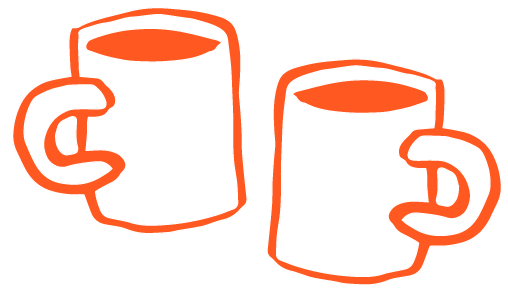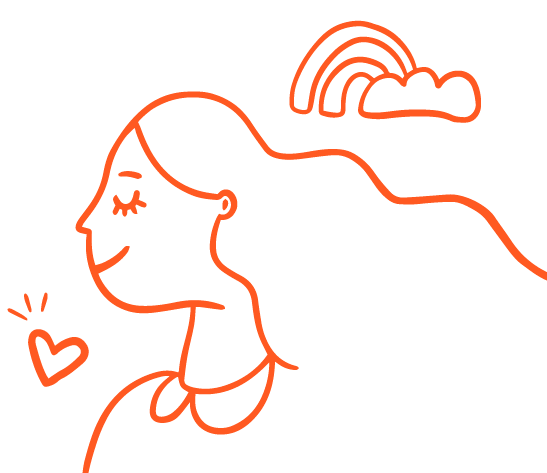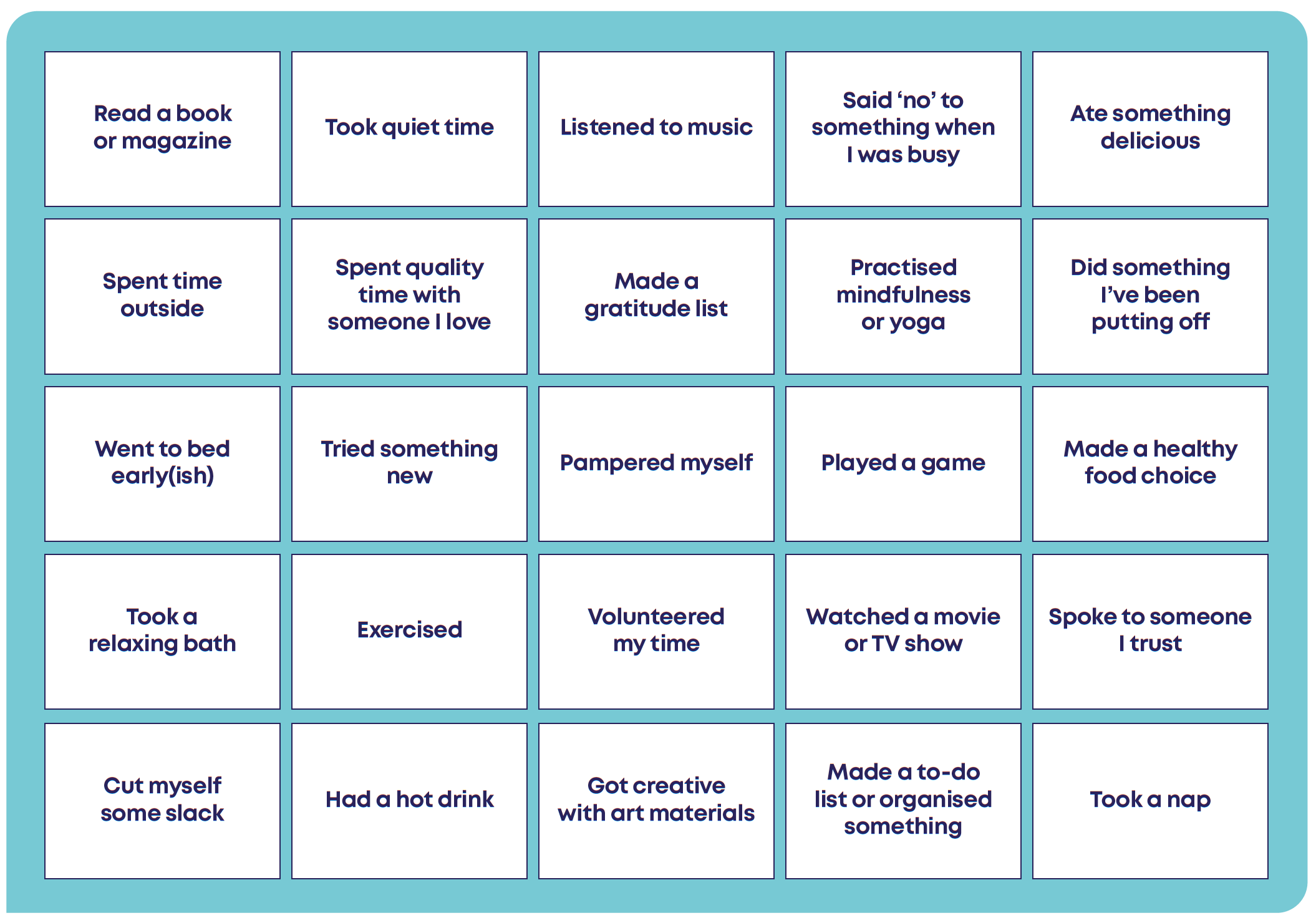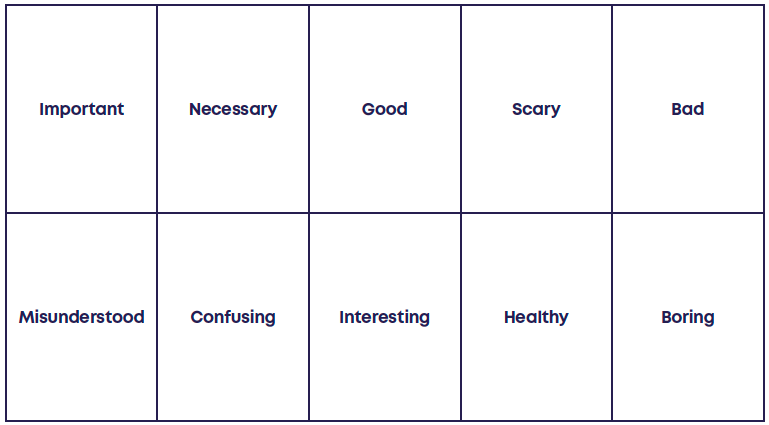Youth materials & ideas
This range of fantastic resources has been developed for use by teachers and youth leaders throughout the year.
We hope these activities can support you in how you educate and talk about mental health with young people.
These resources can be used to develop your understanding of how a range of factors can contribute to young people’s wellbeing.
We have provided you with practical examples of age-appropriate activities to promote wellbeing in young people which will work in both formal and informal education settings.

Primary school activities
Secondary school activities
Guidelines and tips for speaking to young people about mental health and wellbeing
Why do we need to talk about mental health with young people?
- Rates of probable mental disorder increased between 2017 and 2021 in six to sixteen-year-olds from one in nine to one in six and in 17 to 19-year-olds from one in ten to one in six. (NHS Digital, 2021).1
- A variety of stress and pressures on young people, including social media and technology, can affect their ability to cope and impact possible mental health issues.
- We know that most adults living with mental illness experienced their first mental health problems at a young age. In fact, 50% of all lifetime cases of mental illness begin by the age of 14 and 75% by the age of 24.2
- If young people know that support is available for their mental health and they know where they can get this support, we help build the foundations for a better future.
How do we talk about it?
- We need to use boundaries when working with groups of young people. Setting out the aims for our conversations about the subject can help us stick to these parameters. Our aims for these sessions may be: To raise awareness about mental health as something that affects us all
- To encourage people to talk to each other rather than isolating themselves
- To encourage the young person to seek help when they need it. If you broke your ankle you would not wait to see if it could get better on its own. We should take the same approach with our mental health
- Use a ‘light’ voice when talking about the subject. If we convey anxiety or seem uncomfortable with the information, we give the impression that this is a hard or ‘heavy’ discussion
Key points to educate young people on mental health
- We all have mental health just as we all have physical health.
- Mental health is about the way we feel about ourselves and the world. Our feelings and thoughts are part of our mental health.
- No one can see inside our head, so we need to tell people how we feel.
- When our feelings and thoughts seem to be out of control or worry us we need to speak to a trusted adult. We may decide to speak to someone we know well and feel comfortable with, such as a parent or carer, grandparent or other family member or a school counsellor or teacher. There are also charities, such as ChildLine and Young Minds, where we can speak to someone anonymously.
- We can get help to get better when experiencing mental health problems.
How do we look after our mental health?
- Talk to our friends and socialise with people who make us feel good about ourselves.
- Make sure we get enough sleep and enough food to eat (we need to look after our minds as well as our bodies!).
- Social media can be a great way to socialise and films and TV can help us unwind but we do need to take regular breaks. We also need to be aware that light from phone screens and laptops or computers can interfere with a good night’s sleep.
- Hobbies such as team sports, walking the dog, listening to music or expressing ourselves through art or writing can make us feel better and distract us from life’s stresses.
- It’s okay to speak to an adult we trust about how we feel.
Primary school activity
Smile activity
Suitable for Year 1+
Ask everyone to think about one thing that makes them smile.
Ask who would like to share what makes them smile. They can also say why it makes them smile if they want to.
Ask why do we like to smile or make other people smile?
Option 1 (Shabbat appropriate)
Put out pictures of lots of different things that might make the children happy. For example, friends, animals, smiles, the sun, toys, yummy foods.
Make sure you have multiples of each picture in case more than one young person wants to use it.
Give each child an envelope/box or bag and ask them to put a few pictures into their new smile box. If you don’t have an envelope/box or bag, you can ask them to choose their pictures and think about where they might put them so they can see them often or to keep them safe.
Remind them that they can always think about the things that make them smile or look in their smile box. This can be useful if you are having a day that is making your face frown or looking a bit sad. We all have those sorts of days sometimes and it is important to let our teachers, friends and parents or carers know.
Option 2 (Use art materials)
Provide art materials and paper that are age-appropriate for your group to use.
Encourage everyone to draw a few things that make them happy.
You can print off some of the ideas in option 1 to help prompt or remind them what they thought about at the start of the activity when we asked them what made them smile.
For older kids
If your group are older primary school children, you can ask them to create a smile poster to help make other people smile that can be helpful to them especially if they are having a difficult day.
Primary school activity
Mental health acrostic poems
Suitable for all years
Ask the group: “What is mental health?”
Collect their ideas on board/paper and make sure to explain that mental health is how we think, feel and behave in the world. Remind the group that we all have mental health, and it is just as important as physical health.
Give an example of how our mental health can impact our thoughts, feelings and behaviours. Such as, if we do badly on a test, we may think negative thoughts like “I am a failure” and that is likely to affect our feelings as we may feel sad or upset. This in turn will also impact our behaviour and we may lose motivation to do our work, try something new or socialise.
However, the opposite is also true. If we do well in a test, we will feel happier and have positive thoughts such as “I can do this!”. This will affect our attitude and behaviour as we might be more willing to engage with work or try and achieve something new.
Activity
In pairs or small groups, write down the word ‘MENTAL HEALTH’ vertically. For each word, try to think of a sentence that is mental health related to create a poem. Remember, poems don’t have to rhyme unless you want them to.
For younger children, you can do words rather than poem sentences.
Offer the pairs / groups the option to read out their poems to the wider group.
Example
My mental health is important to me
Everyone has it naturally
Needing to look after my mental health
Talking about it with somebody else
Awareness raising is the key
Letting someone know what it’s like to be me
Helping a friend or a listening ear
Everyone needs someone to hear
About how they think and feel
Let’s be honest mental health is real
Try out different things for self-care
Have a chat with your GP, if life is hard to bear
Primary school activity
Write a letter
Suitable for all years
Ask the group why it is important to look after our mental health. Ensure they understand that mental health is how we think, feel and behave in the world.
If no one is answering, suggest they discuss the question in pairs first and then feedback to the group.
Share that looking after our mental health is important, just like we look after our physical health. It allows us to do everything that is required of us, making sure we have the energy and motivation to do school work, socialise with our friends, help others, engage in extracurricular activities or hobbies, exercise, try new things, take time for ourselves etc. Looking after ourselves is also important to help us manage better when times are hard or we are struggling with something.
Explain that the word we use for looking after our mental health is self-care. We should all be practising self-care weekly but it is not a replacement for seeking help from a trusted adult or a GP if we need it. Some of us may need both.
Ask the group for some ideas for self-care. You could either gather these from the group and see if you can collect a self-care idea for every letter of the alphabet or suggest they work in partners, thinking of two things they already do and one thing they would like to try. Invite everyone to share at least one idea for self-care. See how many different ones you can collect.
Acknowledge if someone suggests talking to someone they trust or with a friend. Make sure this is included on your list.
Explain that talking is one of the most important forms of self-care and this may mean talking to an adult we trust, be it a parent or carer, teacher, youth worker or a healthcare professional like a doctor. We may need to talk to an adult when the situation is more than we can manage or requires extra support. At other times, speaking to a trusted friend may be helpful.
Activity
Ask the group to write a short letter to a friend who lives far away and is having a hard time at school. What would you include in the letter? What would you do to reassure your friend or offer advice?
If there is time, you can invite some of the group to read out some or all of their letter if they want to. Make this an option only.
Ask the group if there is a difference to how we speak to our friend in the letter when they need support and how we may speak to ourselves.
If no one suggests it, ask the group if we tend to be kinder and more understanding to our friends, then we would be to ourselves.
A great way to practise self-care is to remind ourselves to speak to ourselves like we would a friend.
For example, when we make a mistake or don’t do as well as we hoped in an exam or piece of work, would we tell our friend they were stupid or should have tried harder? Or would we be kind to them and reassure them that no one noticed the mistake, that it wasn’t a big deal and that there are things we can do so it doesn’t happen again?
Primary school activity
Self-care bingo
Suitable for all years
Self-care bingo is a great activity for primary school / year 7 pupils to get them thinking and talking about what they’ve done recently to look after themselves. It could be spending time outdoors, listening to music or trying something new.
Aims and objectives
To encourage young people to compare and discuss with one another what they do for their own wellbeing.
Instructions
Explain to your pupils that you are going to play bingo with a twist!
Give everyone a self-care bingo card and a pen.
Each pupil should walk around the room and ask one another “What do you do for self-care?”
If someone’s answer is on the sheet, write their name in the appropriate box and if not, write their idea at the bottom of the bingo card.
You can only ask each person once.
Keep playing until either a line or the whole page is completed.
Time required
Approximately 30 minutes
Resources required
Bingo cards and pens

Primary school activity
What is mental health?
Suitable for Years 5 and 6
Part 1
- Tell the group you would like them to complete the sentence ‘mental health is…’
- Use the range of adjectives listed below. You can stick these around the room or put them on pieces of paper on the floor. If you are using an online platform, put the words on a PowerPoint slide and share your screen.
- Ask everyone to either pick an adjective up or pick one that completes the sentence.
- Invite them to say why they chose it if they would like to.
- When everyone who wants to speak has had their chance, explain that mental health is how we think, feel and behave in the world.
Adjective suggestions for completing the sentence:
Important
Necessary
Good
Scary
Bad
Misunderstood
Confusing
Interesting
Healthy
Boring
Part 2
1. Use one or both examples below to illustrate how our thoughts and feelings can change how we behave.
-
- Ask them ‘If you were all really noisy today and I wanted you to be quiet, how might I feel?’
- When they say something like cross/ angry/sad, ask them: ‘Am I more likely to be nice to you and choose something fun to do, or might I be a bit more strict with you?’
OR
-
- If you are watching TV and someone comes in and changes the channel, how might you feel about that?
- When they say something like annoyed/angry/upset, ask them: ‘Are you more likely to politely ask for them to change it back, or might we raise our voices and shout or try and change it back ourselves?’
2. Explain that this shows how our mental health is important because it can change how we think and feel and that will change how we behave towards those around us.
3. Use this as an opportunity to let them know that if they are not feeling good about something, instead of acting in a certain way we need to tell an adult we trust how we are feeling. No one can read our minds, so we need to tell people how we feel so they can help us.
Secondary school activity
Self-care conversation
Suitable for all years
- Share the quote: “You can’t pour from an empty cup.”
- Ask the group what their initial thoughts or reactions are.
- Then ask if they think it is relevant to what we know about self-care or their age group in terms of self-care.
- Acknowledge that at times it can be hard to prioritise looking after ourselves. This may be because we are very busy managing lots of pressures on our time. Or it may be because we find ourselves trying to help other people so it’s hard to find time to look after ourselves.
- Remind them that we all need to look after ourselves otherwise our batteries will run out. We all feel better when we are recharged.
- In pairs, ask them to think about one thing they do for self-care and one thing they’d like to try out.
- Ask the pairs to share back.

Secondary school activity
What is mental health?
Suitable for all years
1. Ask everyone to complete the sentence ‘Mental health is…’ with an adjective of their choice.
2. Go around the room and ask people to share the adjective that they would use.
3. Share some key messages about mental health as follows: We all have mental health just as we all have physical health.
- Mental health is about the way we feel about ourselves and the world.
- Our feelings and thoughts are part of our mental health.
- We need to look after our mental health, just as we would look after our physical health.
- We can support our wellbeing by doing things we enjoy or help de-stress us.
- No one can see inside our head, so we need to tell people how we feel.
OR
- Ask everyone to complete the sentence ‘Mental health is…’ using a twitter format.
- Ask them to consider what is the most important message about mental health as tweets have limited characters.
- Encourage them to include hashtags.
- If you have whiteboards or pieces of paper/pens this is a fun way to do it. Or you can ask people for their thoughts or if you’re online to share them in the chat function.
- Share some key messages about mental health as above.

Secondary school activity
Mythbusting mental health quiz
Suitable for all years
Part 1
Put your groups into teams. Depending on how many young people you have, there may need to be more than two teams.
Ask them to pick a team name.
Tell them that you will read a mental health quote to them and they will need to answer true or false.
Agree a way for the teams to answer. This could be hands up, a buzzer if you have one, a noise each team will make or someone from the team standing up.
If they get the answer right they are awarded a point.
If they can explain why or give more accurate information they will get an extra point.
After each myth is ‘busted’, use some of the key messages in the resources to provide more information.
You may want to think of a fun way to keep score. This can be done by keeping a score board or by assigning sweets/beads/buttons to each team: one per point.
Mythbusting mental health quiz (with key messages about each quote for you to share after each question)
Only some people have mental health – FALSE
We all have mental health in the same way that we all have physical health. They both need looking after as they can impact each other.
Our mental health changes over time – TRUE
Our mental health is always changing and will go up and down. Sometimes big life events or stresses may cause it to change. Other times it could be a build up of lots of little things in a short time period which impact our mental health.
I can look after my mental health – TRUE
This is the concept of self-care. There are things that we can do to help boost our mental health which can make us more productive and motivated and give us more energy. One of the most important forms of self-care is talking about our thoughts and feelings with a trusted adult. Part of looking after our mental health is also getting support from a medical professional if we are worried about our health.
We shouldn’t talk about mental health – FALSE
It’s really important that we talk about mental health. By speaking about it we teach others to do the same thing too. When we talk about mental health we help combat stigma where people may not fully understand mental health and therefore treat people differently. It also helps to highlight how important it is that we look after our mental health and get support if we need it.
Mental health is as important as physical health – TRUE
Our mental health and physical health are equally important and make up our overall wellbeing. When our mental health isn’t as good as it could be, it might start to affect our immune system so we’re more likely to pick up a stomach bug or a cold. If our physical health needs a boost, it may start to impact our mental health and we may find our mood becomes lower or we become more stressed.
Mental health isn’t the same as mental illness – TRUE
We all have mental health but we don’t all have a diagnosis of a mental illness. It is thought that in this country one in four British adults experience at least one diagnosable mental health problem in any one year and one in eight 5-19-year-olds had at least one mental disorder when assessed in 2017.
Stress won’t impact my mental health – FALSE
Stress is one of the areas of our lives which is most likely to impact our mental health. If we think about the times when our mental health might have needed a boost, it’s likely to be during times when we were stressed – possibly during exam season or when we had a deadline. If our stress levels are increasing and we’re finding it difficult to manage, it’s important that we talk to a trusted adult about it. They can help us think about ways to manage our stress. Having someone to talk to can also be good stress relief.
I shouldn’t go to my GP about my mental health – FALSE
Our doctor is the right person to go to if we have concerns about our mental health. They are there for both our physical and mental health because, as we’ve seen, they are connected. A GP can help us think about who we can talk to or some self-care options and if needed, refer us to other professionals for further support.
Mental health can affect how I feel – TRUE
Mental health is all about how we think, feel and behave in the world so it is linked to how we feel. Our thoughts and emotions can be an indication of our mood and the state of our mental health.
My mental health can affect my physical health – TRUE
When our mental health needs a boost or our stress levels are high we may experience changes to our physical health. This is most likely to be headaches or aches and pains from being tense and stressed. Or being more likely to pick up a cold or stomach bug.
Part 2
After the quiz, ask the group why it is important to mythbust around mental health.
If needed, you can prompt them by thinking about where we get our mental health information and if it is always accurate.
If needed, suggest the group discusses the answers in pairs or smaller groups before sharing their thoughts.
As a whole group, think about what might happen if information is inaccurate. For example, people may not know where to get help, people might not look after themselves, stigma may increase, etc.
Secondary school activity
Mental health influencers
Suitable for Years 9+
- Divide the students into small groups.
- Assign each group one of the mental health influencers, which can be found in the resources below.
- Tell them they will be taking part in a debate to find the most influential mental health influencer.
- They will have 10 minutes to discuss in their teams why their influencer has contributed the most to mental health and raising awareness.
- One by one, each team will have three minutes to pitch their argument to the other groups.
- Let them know that when they have 30 seconds left of their pitch, you will raise your hand to warn them.
- At the end, everyone has one vote but they can’t vote for the person they pitched for. You can do this by raising hands, writing the name on a piece of paper or ticking a name off on a piece of paper, ballot style.
- Count the votes and announce who was voted the most influential mental health influencer.
- Open up the discussion about why it is important that we still educate and raise awareness about mental health.
- Ask the group if they think this has improved in recent years and if they think we still need influencers for mental health and why.
- Finish off the discussion by asking if influencers need to be high profile like the people we discussed. Help them think about what we could do to raise awareness.

 Olly Alexander
Olly Alexander
Appearing on The Surgery and Years & Years, Olly Alexander spoke out about feeling like he couldn’t tell anyone about his bulimia and self-harming. “All throughout school I really struggled with mental health problems, loads of different things, and I never told anyone,” he said. “Never told my mum. And I think, looking back, it began to eat away at me. I wish I had talked sooner.”
Now, Olly knows the importance of speaking up, after seeking help from a therapist. “Today and for the rest of my life I think I’ll be using the tools I’ve learnt from medical professionals, from what I’ve learnt from therapy, from what I’ve learnt from friends and talking about things.”
 Kristen Bell
Kristen Bell
In an interview with The Off Camera Show, Veronica Mars star Kristen spoke out about her anxiety and depression, and how nobody should feel shame over taking medication to control their mental health.
“I got on a prescription when I was really young and I still take it today and I have no shame in that because my Mom had said to me, ‘If you start to feel this way, talk to your doctor, talk to a psychologist, see how you want to help yourself,’” she said.
“If you do decide to go on a prescription to help yourself, understand that the world wants to shame you for that. But in the medical community, you would never deny a diabetic his insulin.”
 Dwayne ‘The Rock’ Johnson
Dwayne ‘The Rock’ Johnson
Appearing on an episode of Oprah’s Master Class, Dwayne – who suffered from depression in his early 20s – emphasised the importance of not hiding or being ashamed of mental health issues.
“I found that with depression, one of the most important things you could realise is that you’re not alone,” he said. “You’re not the first to go through it; you’re not going to be the last to go through it… I wish I had someone at that time who could just pull me aside and [say], ‘Hey, it’s gonna be okay. It’ll be okay.’ So I wish I knew that.”
 Kerry Washington
Kerry Washington
Speaking to Essence magazine, the Scandal star talked about her unhealthy relationship with food and compulsive exercising.
“I used food as a way to cope – it was my best friend,” she said. “I’d eat anything and everything, sometimes until I passed out.
“But then, because I had this personality that was driven toward perfectionism, I would tell people I was at the library, but instead go to the gym and exercise for hours and hours and hours. Keeping my behaviour a secret was painful and isolating. There was a lot of guilt and a lot of shame.”
Kerry went to therapy after being approached by her dance teacher about her eating disorder. She continues to see a therapist – as well as a nutritionist – to help her communicate her feelings instead of using food as a crutch.
Secondary school activity
Mental health in the news
Suitable for Years 9+
Part 1
1. Show the group the different newspaper headlines which are reporting about mental health, in the resources below.
2. Ask them to suggest what the story behind the headline might be. They can work in teams to do this or as one big group.
3. You can prompt the discussion by asking:
- What do we think the story is?
- What does it tell us about mental health?
- Do we think it is a positive/negative headline?
4. Once the headlines have been discussed, share with the group what the story actually is. It might not be what we thought.
5. Acknowledge that headlines can be misleading, especially if we only see headlines and don’t read the full articles.
6. Ask the group what might be the impact on people reading these headlines? Do they get the full story? Is it easy to misinterpret or misunderstand what’s being said?
7. Ask the group to consider if the articles were stigmatising in any way e.g. Do they encourage a negative perception about mental health or those with a mental illness? What might be the impact if the media is promoting or sharing inaccurate or harmful information?
Part 2
1. Ask each person to create their own media headline.
2. The headline could reflect something about young people’s mental health which they think the general public should know.
3. If needed, start a discussion on what they, as young people, think adults should know about young people’s mental health or the pressures or experiences of young people in the 21st century. They can use these ideas to create their headlines.

NHS staff taking 3.5 million sick days for mental health problems
https://www.independent.co.uk/news/health/nhs-staff-mental-health-sick-coronavirus-a9617806.html
Prince William tells Peter Crouch it’s not weak to share your feelings
https://www.independent.co.uk/life-style/royal-family/prince-william-mental-health-peter-crouch-podcast-interview-duke-cambridge-a9642321.html
‘It all crumbled’: pop stars on mental health in the age of Covid
https://www.theguardian.com/music/2020/aug/24/it-all-crumbled-pop-stars-on-mental-health-in-the-age-of-covid
Study finds half of 16- to 24-year-olds hit by ‘lockdown loneliness’
https://www.theguardian.com/society/2020/jun/08/study-finds-half-of-16–to-24-year-olds-hit-by-lockdown-loneliness
Teens’ anxiety levels dropped in lockdown – study
https://www.bbc.co.uk/news/uk-53884401

